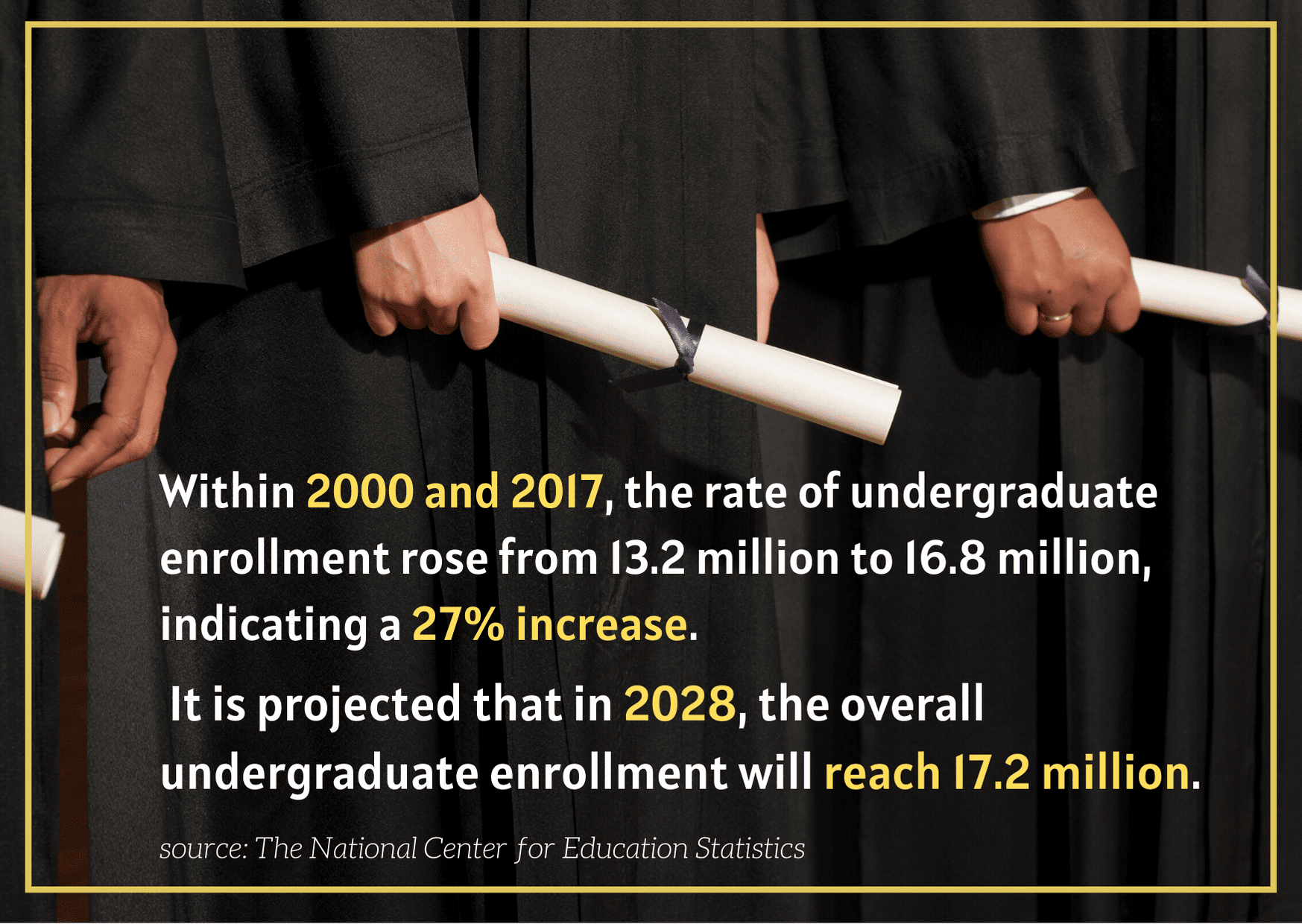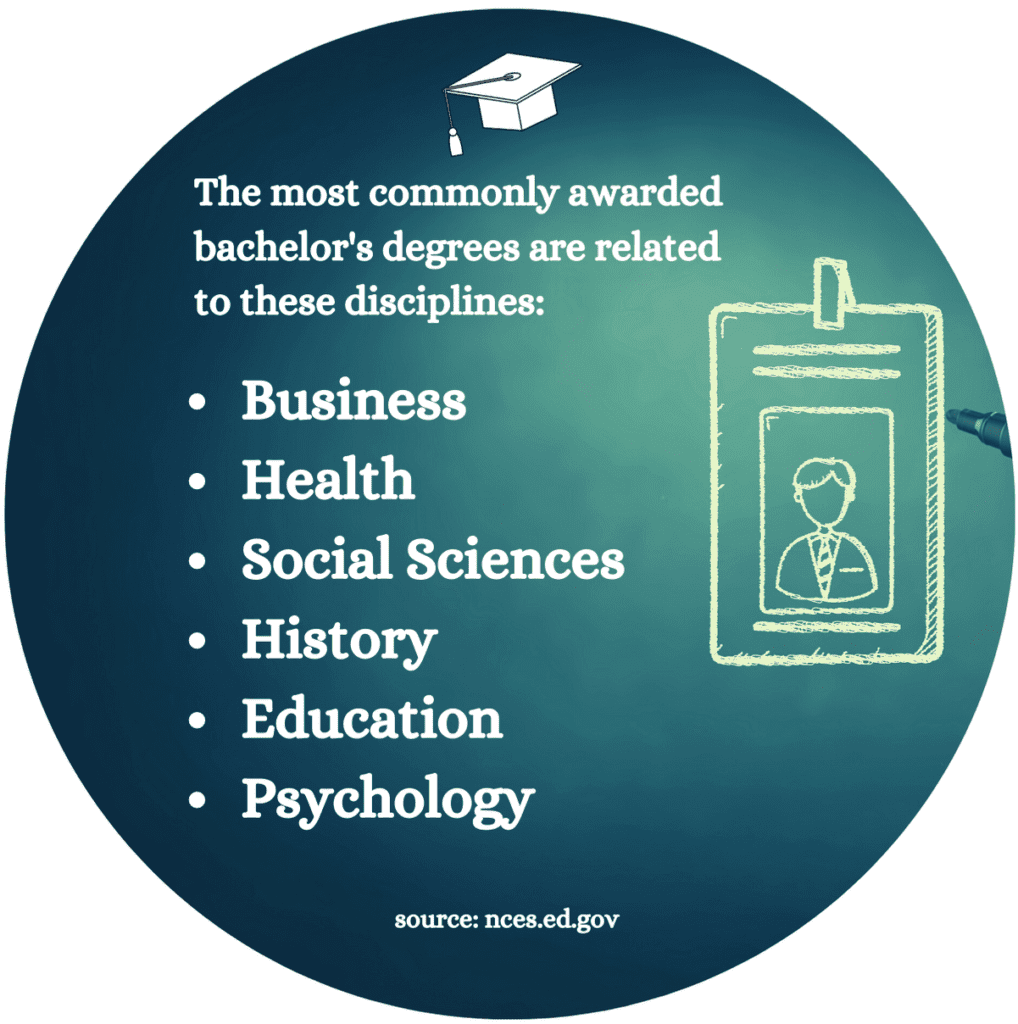
Every year, a list of the top high-paying and in-demand jobs in the U.S. comes out, and healthcare positions, particularly doctors, dentists, and its various sub-specialties, always come out on top. However, a doctorate is costly for many Americans.
With the steady rise in the number of associate degree and certification graduates earning equally or even more than their bachelor-holder counterparts, the counter-argument for earning a bachelor’s degree echoes louder.

That said, though, a bachelor’s degree still provides its holder an advantage in terms of career advancement opportunities, which is why most of the jobs listed below are managerial positions that consistently break the $100,000-median annual salary mark.
Besides, the fact remains that most employers, huge, multi-national firms, still require a bachelor’s degree from its employees even when it’s not inherently necessary for the job.
*****Let us help you find the best degree program for your career aspirations!*****
50 HIGHEST PAYING CAREERS WITH ONLY A BACHELOR’S DEGREE
For the salary rankings, the term “median” instead of “average” will be used here to describe the annual wage. This is to factor out salary outliers, that presents an effect if the averaging measure is used. By using the median measure of central tendency, the salaries described here are more neutral and objective estimates to manage reader expectations better.

Explore our list effortlessly by using these page-jumps:

Petroleum Engineer
I.T. Manager
Architectural and Engineering Managers
Marketing/Advertising/Promotion Managers
Financial Managers
Airline Pilot
Natural Science Managers
Strategy Manager
Sales Managers
Compensation and Benefits Managers
Data Scientists
Public Relations and Fundraising Managers
Solution Architect
Product Manager and Product Marketing Manager
Actuaries
Software Developers
Senior DevOps Engineer
Registered Nurse
Front-End Developers / Front-End Engineers
Data Engineer

Petroleum Engineer
Median Annual Salary: $130,850

Bachelor’s Degree Requirement:
- Bachelor of Science in Petroleum Engineering
The Bureau of Labor Statistics (BLS) reports that even with the move towards sustainable and renewable energy sources, the continuous upward trend of petroleum products and the global initiatives for geothermal energy production will steadily drive up the demand for petroleum engineers in the next decade.
Backed with solid foundations in Mathematics, Chemistry, Geoscience, Physics, Mechanics, Statistics, Petroleum Science, Natural Science, Engineering Sciences, and Geosystems Design and Planning, graduates of Bachelor of Science in Petroleum Engineering are tasked to plan, develop and manage the exploration, production, and refinement of oil and gas products.
They are also involved in other energy-harnessing activities, such as for geothermal and hydropower sources. Their expertise in earth sciences also makes them valuable to environmental efforts. In particular, they are consulted for subsurface waste disposal, reduction of greenhouse gases through the underground infusion of carbon dioxide, gasification of fossil fuel, and pollution reduction.
Texas, New Mexico, and North Dakota lead the oil and gas production domestically. It’s little wonder that these states are home to the top-ranked Petroleum Engineering undergraduate programs, including:
- University of Texas – Austin Cockrell School of Engineering
- University of North Dakota (UND)
- New Mexico Tech (NMT)
NMT’s undergraduate program also has a partnership with the Petroleum Recovery Research Center (PRRC), providing its students with the chance to be involved in the organization’s research activities while completing their degree.

I.T. Manager
Median Annual Salary: $97,059

Bachelor’s Degree Requirement:
- Bachelor of Science in Management Information Systems (MIS)
- Bachelor of Science in Business Administration (Specialization: MIS)
- Bachelor of Science of Business Administration in I.T. Management
Businesses today are relying more on automation and technology. Business and management professionals need to have some technical know-how, such as programming skills, and vice-versa for I.T. folks. This is how an I.T. manager bridges that gap. They turn business operations and management into an exact science by leveraging the capabilities of modern technology and data.
A Bachelor in Management Information Systems (MIS) is usually required for this highly in-demand position. Schools like Western Governors University (WGU) in Utah offer a bachelor’s degree in Business Administration with a focus or significant on I.T. Management, which can be taken online. These programs produce graduates who are trained in management, finance, and business analytics, such as those from the MIT Management Sloan School.
As with most managerial positions, being an I.T. Manager is not an entry-level position. I.T. Management or MIS graduates can start as a business, computer systems, or information security analysts. The demand for all these positions isn’t only high but also transcends across industries.
A quick LinkedIn search reveals that I.T. firms like Amazon and Microsoft, and companies from other industries like hospitals, manufacturing, insurance companies, and even schools like the University of South Carolina or the University of Georgia are in the hunt for I.T. Managers.

Architectural and Engineering Managers
Median Annual Salary: $152,350

Bachelor’s Degree Requirement:
- Bachelor of Architecture
- Bachelor of Engineering
Architecture and engineering fields usually go together, seamlessly collaborating to produce high-quality and timely projects or deliverables. Architectural and engineering managers (AEM) are essential roles because as complementary as these two professions are, the project needs and requirements of each team are still different.
BLS itemizes the job descriptions of AEMs, which require technical expertise in their respective fields and practical managerial and accounting skills. Project staffing, budgeting, and coordination also fall on their shoulders. They work closely with purchasing, production, marketing, H.R., finance, or logistics departments to ensure that all project requirements and deliverables are achieved with optimum quality and within the project’s budget and timeline.
Being a managerial position, aspirants are required to work for years as architects or engineers tackling different projects. Experience in leading projects or teams is also a big plus. Otherwise, bachelor degree holders who wish to advance quickly to managerial positions may take MBAs or master’s degrees in Engineering Management or Technological Management.
Cornell University and the Rhode Island School of Design (RISD) are among the top-ranked and internationally recognized U.S. schools for architecture. At the same time, engineering aspirants can look into the MIT School of Engineering, Stanford University, or CalTech‘s vast array of Engineering offerings – from mechanical, to civil, electrical, to environmental, and even aerospace engineering.

Marketing/Advertising/Promotion Managers
Median Annual Salary: $133,380

Bachelor’s Degree Requirement:
- B.A. in Communication
- B.S. in Marketing
- B.S. in Business Administration
- B.S. in Economics
- B.S. in Advertising
- B.S. in Marketing
- B.A. in Journalism
The field of Marketing is one of, if not the most, diverse professions in the job market today. The American Marketing Association (AMA) throws the words “creating,” “communicating,” “delivering,” and “exchanging” in defining its trade or profession.
Therefore, if you have a degree in the arts, design, communication, journalism, management, sales, promotion, and even engineering and I.T. – as these degrees cover all four roles mentioned by the AMA – you can be employed in any of these positions.
As ad campaigns move to the digital space, the demand for these three interconnected positions will continue to rise. The digital media has allowed them to better identify and tap potential target markets via various e-channels like social media, Search Engine Optimization (SEO) sites, targeted web ads, etc.
Most noteworthy schools that offer these degrees with reasonable in-state fees are the University of Michigan – Ann Arbor (Michigan Ross) and the University of California – Berkeley (Berkeley Haas). Both schools consistently rank because of their exceptional undergraduate Marketing programs.

Financial Managers
Median Annual Salary: $131,710

Bachelor’s Degree Requirement:
- B.S. in Finance, B.S. in Accounting
- B.S. Economics, B.S. Business Administration
Financial health is vital to every institution, whether it’s the household, the government, or private companies. In the case of companies, financial managers are responsible for overseeing its liquidity, cash position, and financial reporting, both internally to the organization and externally, such as for legal purposes like taxation.
A variety of Bachelor in Science degrees are available to aspiring financial managers such as Finance, Accounting, Economics, or Business Administration. They must learn about taxation, industry-specific laws such as those for insurance or investments, budget, and appropriation, etc. Some entry-level positions graduates can apply for include financial analyst, investment advisor, budget analyst, insurance underwriter, accountant, credit analyst, tax associate, and auditor.
With ample and relevant experience, Financial Managers can also be one of the following, each position with its area of focus: Controllers, Treasurers, Credit Managers, Cash Managers, Risk Managers, or Insurance Managers.
In 2019, the U.S. News and World Report listed the University of Pennsylvania as the best institution in the finance and accounting category based on peer surveys.

Airline Pilot
Median Annual Salary: $134,630

Bachelor’s Degree Requirement:
- Bachelor of Science in Aeronautics
- Bachelor of Science in Aviation
Who hasn’t dreamed of being a pilot? Soaring the skies, flying above the seas, past the clouds, with the stars and the sunrise on the horizon; no job is better than this, and even better is that a bachelor’s degree is not always required, although earning one is strongly recommended by pilots themselves.
Some airline companies do require its pilots to have college degrees, and any degree will do but a strong background in STEM courses as early as the high school will go a long way for aspiring pilots.
It should be noted that airline pilots are different from commercial pilots. One difference is the bachelor’s degree requirement, which is a case-to-case basis for airline pilots while it’s not a requirement at all for commercial pilots. But the most evident distinction between the two is that airline pilots, as the name suggests, work for airline companies under a rigid schedule, flying over both passengers and cargo.
Commercial pilots are involved in chartered flights and other unscheduled airline activities such as private flights. Most airline pilots start as commercial pilots first.
For those seriously considering a career in aviation, many airline companies have teamed up with universities with renowned aviation programs. These include the University of North Dakota (UND), Purdue University, and Embry-Riddle Aeronautical University (ERAU) to provide scholarships for students and a direct path to employment after earning their degree and license to fly.

Natural Science Managers
Median Annual Salary: $137,900

Bachelor’s Degree Requirement:
- Bachelor of Science in Natural Sciences
- Bachelor of Engineering
- Bachelor of Science in Chemistry
- Bachelor of Science in Physics
- Bachelor of Science in Biology
- Bachelor of Science in Microbiology
Scientists are the building blocks of knowledge, and every discovery or invention is a collaborative product of teams of scientists from all disciplines, led by a fellow scientist who doesn’t only have technical expertise but has administrative and managerial experience as well. This is the role of a Natural Science Manager (NSM).
The Natural Science Managers are directly in-charge of research projects, liaising with the research team and with the project executives, sponsors, or donors, from the proposal to project execution, to the presentation of results, and some extent, the real-world application of the results.
They also manage to staff the laboratories used by the research team and implement unbiased quality checks of the methodologies used and the results, which is of utmost importance to scientific projects.
Most NSMs are scientists and researchers who advance to managerial positions through time and experience. Natural Science Managers employed in pharma and medical manufacturing companies are paid the most. On the other hand, universities have the highest concentration of NSMs, but they only make about $80k a year.
Scientific Research and Development Services such as IQVIA (formerly Quintiles and IMS Health) provide a balance of competitive salaries, opportunities for career advancement, and employability.
MIT, Harvard University, and Stanford University are the top schools in the U.S. to obtain a bachelor’s degree in the field of natural science (i.e., Chemistry, Physics, Biology, etc.).

Strategy Manager
Median Annual Salary: $109,923

Bachelor’s Degree Requirement:
- Bachelor of Science in Strategic Management
- Bachelor of Science in Business Administration
In the early ’90s, large companies faced a distinct coordination problem when strategy discussion was confined to the executive level, and execution and reporting were isolated and reported from different views or levels. This resulted in an apparent disconnect among the different levels of its workforce.
A Strategy Manager serves as the link between an organization’s vision and strategies, accomplishments, and it fills that void created by a lack of efficient information dissemination and strategy execution from the organization’s top rung to the entry-level.
As a relatively new position in the job market, the role of a Strategy Manager continues to evolve. Still, it mainly involves day-to-day interactions with a company’s top management, identifying the organization’s strong points, value offerings, challenges, and areas for improvement.
They also direct the cross-enterprise implementation of approved processes and strategies and oversee the effectiveness of these. It is a multi-tiered and cross-enterprise role that touches upon various levels and departments of the workforce, which is why it commands a competitive salary and is predicted to be one of the most promising careers in the future.
Strategy Managers must be highly analytical and critical. They are also effective written, verbal, and visual communicators, proficient in accounting, economics, entrepreneurship, domestic and international markets, emerging trends, business laws, and I.T., with exposure to data science at the very least. Schools with renowned undergraduate management programs include the University of Michigan – Ann Arbor, University of Pennsylvania, and the University of California – Berkeley.

Sales Managers
Median Annual Salary: $127,490

Bachelor’s Degree Requirement:
- Bachelor of Science in Business Administration
- Bachelor of Science in Retail and Sales Management
Sales Managers lead sales teams and analyze data to drive up the growth of a product or a service. Sales are not just about peddling. With today’s steep competition, companies allot budgets for customer incentive programs, freebies, and other rewards to capture customer interest and loyalty.
Sales Managers are responsible for the proper appropriation of these costs, staff management, and execution of programs that will all lead to their ultimate goal – a sale – and for some products or services, customer loyalty.
Sales Managers can either be office-based, field-based or both and can either engage in business to business (B2B) sales or business to consumer (B2C) sales. They have excellent people skills and are good character and personality readers, as sales strategies are also based on human psychology.
These days, they must also be knowledgeable in e-commerce like online shopping platforms such as Shopify or Amazon, SEO concepts, CRM software such as SAP or Salesforce, and other digital sales media.
They say you don’t need a degree to be a salesman as some are just born to do it. While that may be true for some, having a bachelor’s degree can draw the difference between a simple peddler and a sales manager, or better yet, a Director of Sales.
Graduates of B.S. Business Administration or related business degrees are equipped with the concepts of business management, entrepreneurship, marketing, retail, customer management, supply chain, domestic and international trade, and so on.

Compensation and Benefits Managers
Median Annual Salary: $127,530
Bachelor’s Degree Requirement:
- Bachelor of Science in Human Resource Management

In large companies with more than one thousand employees or with satellite offices, H.R.’s responsibilities are much more complicated. They are divvied up into niches such as training and development, recruitment and onboarding, information system analysts, employee wellness and compensation and benefits.
The Compensation and Benefits team is in charge of distributing employees’ salaries, bonuses, rewards, insurance packages, and other incentives. The team is led by the Compensation and Benefits Manager who, aside from overseeing team activities, is in charge of defining the pay structure of each employee category or level, monitoring salaries across the industry to formulate competitive employee packages, engaging benefit or incentive partners such as insurance providers and HMOs, and preparing and working within the set payroll budget.
The college coursework for aspiring HRM professionals includes social and behavioral sciences, accounting, business, and public law, micro and macroeconomics, probability and statistics, business communication, professional development, I.T., marketing, and operations management.
Students also study HRM core subjects, which include employment law, organizational behavior, talent and performance management, compensation and benefits administration, training, and development, among others.

Data Scientists
Median Annual Salary: $124,693

Bachelor’s Degree Requirement:
- Bachelor of Science in Computer Science
- Bachelor of Science in Statistics
- Bachelor of Science in Data Science
- Bachelor of Science in Data Analytics
- Bachelor in Business Administration
- Bachelor of Science in Mathematics
- Bachelor of Science in Physics
- Bachelor of Science in Economics
- Bachelor of Science in Accounting
- Bachelor in Accounting and Data Analytics
- Bachelor in Engineering
Data is everywhere, and almost everyone can work as a data scientist, as long as a strong STEM subject background is present and is instilled in high school. With its cross-industry employability, being a data scientist is not only highly in-demand but also one of the highest paying jobs of 2020, where only a bachelor’s degree – plus some short courses like programming or statistics – is required.
The value of data science is immeasurable these days, and it opens up opportunities across industries. For example, in a 2018 article by Forbes magazine, data science is described as the key to marketing success, especially in the digital age. Data describes trends which, when combined with creative advertising and executed in the digital space, will turn marketing, commerce, and even politics and governance into fluke-free, evidence-based industries.
Data Science undergraduate programs are offered in schools across the U.S. The World Scholarship Forum lists these as the best colleges for future Data Science professionals:
- Brigham Young University in Utah
- University of Iowa
- University of Michigan – Ann Arbor
- Arizona State University
St. Mary’s University in Texas as the best public and non-profit schools to pursue a degree in Data Science, with a focus on Big Data.

Public Relations and Fundraising Managers
Median Annual Salary: $119,860

Bachelor’s Degree Requirement:
- Bachelor of Science in Public Relations
- Bachelor of Science in Business Administration
- Bachelor of Science in Marketing
- Bachelor of Science in Marketing and Advertising
- Bachelor of Arts in English
- Bachelor of Arts in Journalism
- Bachelor of Arts in Communications
Do you have countless contacts or a vast network of who’s who in various industries and societies? Do you find it natural to come up to people and introduce yourself, or simply love connecting people? Is social media your thing? Do you have a knack for branding, imaging, and a great insight into trends and public perception? Are you charming and persuasive that people just can’t say “no” to you? If you answered “yes” to all these, a career as a Public Relations and Fundraising Manager might be for you.
Although the skillsets are not identical, their roles are complementary. A PR manager is responsible for the public perception of a business or organization. Press releases, organizing interviews, and overall branding of their client are their duties. Fundraising managers work more “behind-the-scenes.”
They reach out to donors, apply for grants, and initiate fundraising activities either for charities, organizations, or campaigning politicians. P.R. managers, who are also good “story-tellers” complement fundraising managers by helping convince potential donors on the value of shelling out money for a charity or say, in an election, a political candidate.
Both civic and private entities employ aspiring P.R. and fundraising specialists. They are commonly employed by social and non-profit groups. Private firms like advertising or broadcasting firms pay lucrative figures for these positions but are not always hiring.
Practically any degree can get you a job in P.R. and fundraising because the skillsets involved are things that you won’t learn in school, but you still need to get a degree just to have credibility.

Solution Architect
Median Annual Salary: $201,807

Bachelor Degree Requirement:
- Bachelor of Science in Information Technology
- Bachelor of Science in Computer Science
- Bachelor of Science in Software Engineering
As businesses move towards automation, techno-functional roles such as Solution Architects have become increasingly in-demand. Solution Architects work closely with functional consultants in developing the project blueprint and with developers in executing it. They continue to oversee the project for any stoppers or changes, ensuring that the client requirements are being met (i.e., lower TCO) and see it through to its completion or go-live.
As a project’s technical decision-makers, Solution Architects also serve as advisors or consultants to top-level management such as CEOs, CIOs, SMEs, and the like. They are also expected to be effective communicators and presenters, as part of their job is to discuss and sell their plan to different kinds of audiences within the organization. With the massive responsibility it entails and the amount of workload, it is no wonder that the unanimous feedback about this position is that it pays so well.
A bachelor’s degree in Computer Science or Software Engineering can pave the way for a career in Solution Architecture. Among the renowned Computer Science, undergraduate programs they can look into are MIT, Carnegie Mellon University, Stanford University, or the University of California – Berkeley.
Typically, S.A.s start as developers, then become lead developers. Along the way, they must gain knowledge and experience in other related concepts such as database design and Unified Modeling Language (UML).

Product Manager and Product Marketing Manager
Median Annual Salary: $141,143

Bachelor’s Degree Requirement:
- Bachelor of Science in Marketing
- Bachelor of Science in Business Administration
These are two of the most confusing roles in product development, especially in smaller companies where these two roles are handled by one person. A Product Manager (PM) is the overall architect of the product, similar to what a Solution Architect does for software solutions (see number 13).
From identifying a market opportunity to the brainstorming phase of the test product to outlining its design, features, and consumer value to communicating with top-level management about product strategy, a PM oversees and does all these and more. And like Solution Architects, they also work with designers, engineers, the marketing and sales teams, and have to execute the plan around set limitations or requirements, such as in the P.M.’s case, usually to a set budget.
A product marketing manager – with the operative word being “marketing” – then takes the finished product and creates market interest and demand for it through strategic campaigns. They are in charge of customer targeting and engagement (B2C) or account penetration and management (B2B).
Both fields require a degree in business, marketing, and other relevant fields. They usually start working in an analyst or specialist role before advancing to managerial positions. They must also develop core competencies and soft skills to be considered for such positions. For example, aspiring P.M.s need to be objective in product design and empathic towards customers. They must also maintain healthy inter-department and professional relationships and handle stress effectively.

Actuaries
Median Annual Salary: $105,900

Bachelor’s Degree Requirement:
- Bachelor of Science in Mathematics
- Bachelor of Science in Actuarial Science
- Bachelor of Science in Statistics
Actuaries are risk assessors who evaluate and manage risk from a financial standpoint. They are well-versed in finance, mathematics, statistics, probability, business management, and other related fields.
Actuaries are highly in-demand. U.S. News hails this profession as one of the best jobs in the business industry for 2018 and in the STEM field. Aspirants must take coursework in mathematics, business management, finance, statistics, and even data science and communications, as the job requires impeccable analytical and communication skills.
They also need to pass the actuarial exams by the Society of Actuaries (SOA) for those who wish to be employed in insurance companies or work on employee benefits and pensions, and or the Casualty Actuarial Society (CAS), for those who wish to work on workers’ compensation, or car, fire and liability insurance. At least one actuarial exam is the minimum requirement set by employers.
Actuaries report a high satisfaction rating and are one of the few professions that employ more women than men. The industry also takes continuing education seriously as actuary candidates (pre-certified actuaries) are expected to take seminars on professionalism, spend at least four years to be a certified associate, and at least two more years to become a fellow.
Interested in being an actuary? Check out the SOA and CAS pages for a list of schools with actuarial undergraduate programs or schools that are affiliated with these organizations.

Software Developers
Median Annual Salary: $109,020

Bachelor’s Degree Requirement:
- Bachelor of Science in Computer Science
- Bachelor of Science in Software Engineering
With almost every industry and service moving towards automation and digitalization, the demand for software developers is at an all-time high. Their roles center on software design, testing, and documentation. They are usually categorized into two: one for application development, like programs for office productivity, and one for system software development, like for operating systems for computing devices such as laptops or mobile phones.
Most developers these days need to have a solid foundation in computer programming or coding. They also need to acquire knowledge and training in the industry in which they will be employed, for example, they need to learn about logistics, production planning or supply chain if they are employed as software developers in the manufacturing industry.
Schools that aspiring software developers can look into include Carnegie Mellon University, CalTech, Cornell University, and MIT.
Acquiring skills certification will be useful for career advancement. Certifications are offered by I.T. vendors such as Oracle or Microsoft or by the Institute of Electrical and Electronics Engineers Computer Society or IEEE. With these certifications and years of experience, software developers can be promoted to dev leads, solution architects, or I.T. project managers.

Senior DevOps Engineer
Median Annual Salary: $163,136

Bachelor’s Degree Requirement:
- Bachelor of Science in Computer Science
- Bachelor of Science in Information Technology
- Bachelor of Science in Software Engineering
As more services and industries are moving to cloud computing technology, the process of migrating existing on-premise infrastructure falls on the hands of the Senior DevOps Engineer.
This is one of the careers software developers can advance to. Working in DevOps involves collaboration with other professionals like product managers as they tackle software or product operability, performance, and security as they transition a client’s physical infrastructure to cloud services.
A bachelor’s degree in Computer Science is an excellent way to start. Other good-to-have skills would be experienced in handling different operating systems like Linux, proficiency in Python, knowledge in IaaS, PaaS, and SaaS, and the essentials of cloud computing as enumerated in this LinkedIn blog (scroll to ‘Phase III’).
Of course, as with any I.T. career these days, certifications are not only advantageous but also essential. Amazon Web Services (AWS) offers its own DevOps Engineers certification. For non-vendor certifications, DevOps Agile Skills Association (DASA) has multi-level certification offerings as well.

Registered Nurse
Median Annual Salary: $77,600

Bachelor’s Degree Requirement:
- Bachelor of Science in Nursing
The only healthcare professional on this list that only requires a bachelor’s degree includes a career as a Registered Nurse. They are part of a team of other healthcare professionals like physicians.
Their roles include assessing and recording a patient’s chief complaint, baseline history, signs and symptoms, administering (but not prescribing) medication, operational knowledge of medical equipment and devices, and explaining post-operative instructions, among other things.
A bachelor’s or associate’s degree in Nursing is one of the minimum requirements to be employed as a Nurse. Still, those aspiring for administrative, academic, and consultancy positions aside from clinical work would benefit more with a bachelor’s degree. Another employment requirement is to pass the National Council Licensure Examination (NCLEX-RN) issued in the state where they wish to work.
Thinking about pursuing a nursing career? Look into these top online nursing schools in the U.S., including West Texas A&M University, University of Wisconsin- Milwaukee, and Penn State World Campus.

Front-End Developers / Front-End Engineers
Median Annual Salary: $78,300

Bachelor’s Degree Requirement:
- Bachelor of Science in Computer Science
Front-end developers and engineers create websites with a focus on their aesthetics, functionality, and ease-of-use. They work closely with clients from the brainstorming phase, to the design and development of the site, to the testing phase until it is rolled out to the client and end-users.
Front-end developers and engineers usually start their careers as web developers. An undergraduate degree is usually not required for web developers. Still, those wishing to advance their careers further and faster may use a degree in computer science, information technology, and other related fields as leverage.
Knowledge and experience in HTML programming and CSS are essential, while a deep understanding of SQL, JavaScript, or PHP may or may not be required, depending on the employer. Nowadays, having mobile app development experience is a big plus.
It matters that you have an eye for design! Graphic designers with web design know-how are also qualified for this position. Certifications, as with other I.T. professions, are always a plus for career advancement. Online “nano-courses” are offered by MOOC portals such as Udacity, while the World Organization of Webmasters (WOW) offers certifications in various levels of web design work.

Data Engineer
Median Annual Salary: $113,929

Bachelor’s Degree Requirement:
- Bachelor of Science in Software Engineering
- Bachelor of Science in Computer Science
Have you ever wondered what the difference between a data scientist and a data engineer is?
A 2019 Forbes article makes the distinction: the difference is in the kind of data these two jobs work on. Data scientists perform their analysis and tests on clean data, and who “cleans” those data? Data Engineers do.
Their extract-transform-load (ETL) method experience allows them to design and build tools for data clean-up, clean and arrange the data, and lay these for data scientists to discover, study, and test. They are also experts in programming, technical architecture, systems integration and clean-up, and machine learning.
A degree in Computer Science sets the path for a career in data engineering. Still, degree holders must work their way through it by acquiring entry-level positions in either programming, developing, or consultancy capacities. Continuing education through “nano-degree” programs or certifications in Big Data Engineering or Analytics will be the key to more career opportunities.

